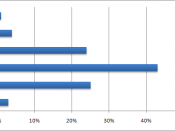Visions of Utopias and Dystopias have been appropriated into different texts, from different contexts from George OrwellÃÂs 1984 (1948), which deals with the contemporary issues occurring in English society during the 1930ÃÂs and 1940ÃÂs, such as the Notion of social classes, nationalism and the loss of privacy to Gattaca (1997) directed by Andrew Niccol which presents us with a world rife with oppression and the consequences of technological development in society and finally Incognito written by Claire Carmichael (2000) which envelops a world where there is a loss of privacy, the introduction of social classes and the consequences of technological development in society. These texts all deal with concepts of the consequences of technological innovation in their respective society which leads to an infringement of personal privacy and the notion of separate social classes.
1984 is one of the key dystopic texts of the 20th century and is centered on the life of Winston Smith who is the key protagonist, in the text we learn of the emergence of distinct social classes; the proles, the outer party and the inner party.
These distinctions between the social classes can be clearly seen when Winston reminisces on watching propaganda films, here in the cinemas the Proles would only be allowed on the bottom rows of seats and that nobody would listen to them as they seemed to be emotionally attached to the sentiments adopted in the propaganda films, this literary device used in the book clearly asserts the fact that they are on the lowest rungs of societyÃÂs ladder.
The film Gattaca also deals with ideas of social classes present in society. The film is set in the future where the rise of eugenics has taken place. In this society you are measured by level of perfectionism of your DNA which has been manipulated, there are few people who have not had their DNA manipulated and they are called the ÃÂin-validÃÂ. At the beginning of the film Vincent the protagonist talks about his childhood where he was accident prone and susceptible to various diseases as a result of not being genetically manipulated to be resistant to diseases. This emphasis a clear cut social class between the ÃÂvalidsÃÂ and ÃÂin-validsÃÂ. To overcome the disadvantage he has Vincent takes on a new identity to show that he can keep up with the rest of the population, a key moment in the film where this is expressed is the scene, where he races his brother out to sea and when asked how he was able to beat his genetically superior brother he retorts ÃÂI never saved any for the way backÃÂ. Some cinematic devices used in the film to extenuate this class divide is the use of close upÃÂs whenever a blood or urine test is taken of the screen which shows whether a person is valid or invalid, this shows the importance placed on being part of a certain social class.
The idea of certain social classes being part of society is a major part of Incognito. Carmichael tells the story of a man and son (Jonathan and Karr Robinson) who have their identities deleted from the central database and their journey to recover it back. The classes in the novel are similar to the ones seen in 1984 where the lowest of the low called the ÃÂobliteratesÃÂ lived in areas near the city centre called the tracts; this is similar to the outskirts of the city in 1984 where the proles live. The ordinary citizens lived near the tracts in suburban like houses and apartments and the upper class politicians lived in sprawling mansions in the outskirts of the city. Some literary devices used to show this is the imagery presented of the areas such as the tracts- ÃÂdingy, desolate areas crawling with verminÃÂ and the upper class mansions- ÃÂsprawling green manicured grass with ornate garden ornamentsÃÂ.
The consequences of technological innovation in society play a major part in 1984. The society of Oceania is under a de-facto state of war with either Eurasia or Eastasia; this has led to technological innovation to protect the citizens such as the use of rocket bombs and floating fortresses. But the intentional misuses of the technologies such as telescreens are in place to keep the society under fear of attack and to allow the authorities to monitor the citizenÃÂs actions. This can be seen in the opening scene of the novel, where Winston tries to avoid the view of the telescreens as he is doing something the authorities would not approve of.
Gattaca has central themes concerning the consequences of technological innovation in society. In Gattaca the society has evolved to the point where it is the norm for genetic manipulation of embryos in the aim of eliminating undesirable properties in the DNA. As a result of this technological innovation, the society has developed discrimination against the people that have not been manipulated. This can be seen in the beginning of the film where Vincent is shown being led out of a school and his parents told that ÃÂthe insurance would not cover himÃÂ. This is one of many examples of discrimination faced by in-valids due to technological innovation in society.
The effect of technological innovation on society is similar to Gattaca in Incognito, where all the peopleÃÂs records are stored in a central database of which the details contained within affect the job able to be got and the quality of life you can lead. But this information could be deleted by the data lord; who was on a similar level to Big Brother from 1984, effectively putting you on the level of tracts which is similar to the Proles and in-valids from 1984 and Gattaca. A key moment in the book where this idea is explored is in chapter 5 where the data lord deletes the Robinsons identities and the ensuing effects show how the consequence of technological advancement can corrupt people.
Through the three texts explored above, it has been showed how visions of Dystopias have been appropriated into different texts regardless of differing contexts over time and have recurring themes of the emergence of social classes and the effects of technological innovation in society.
No Bibliography, just teachers notes and my own analysis of the 3 texts





